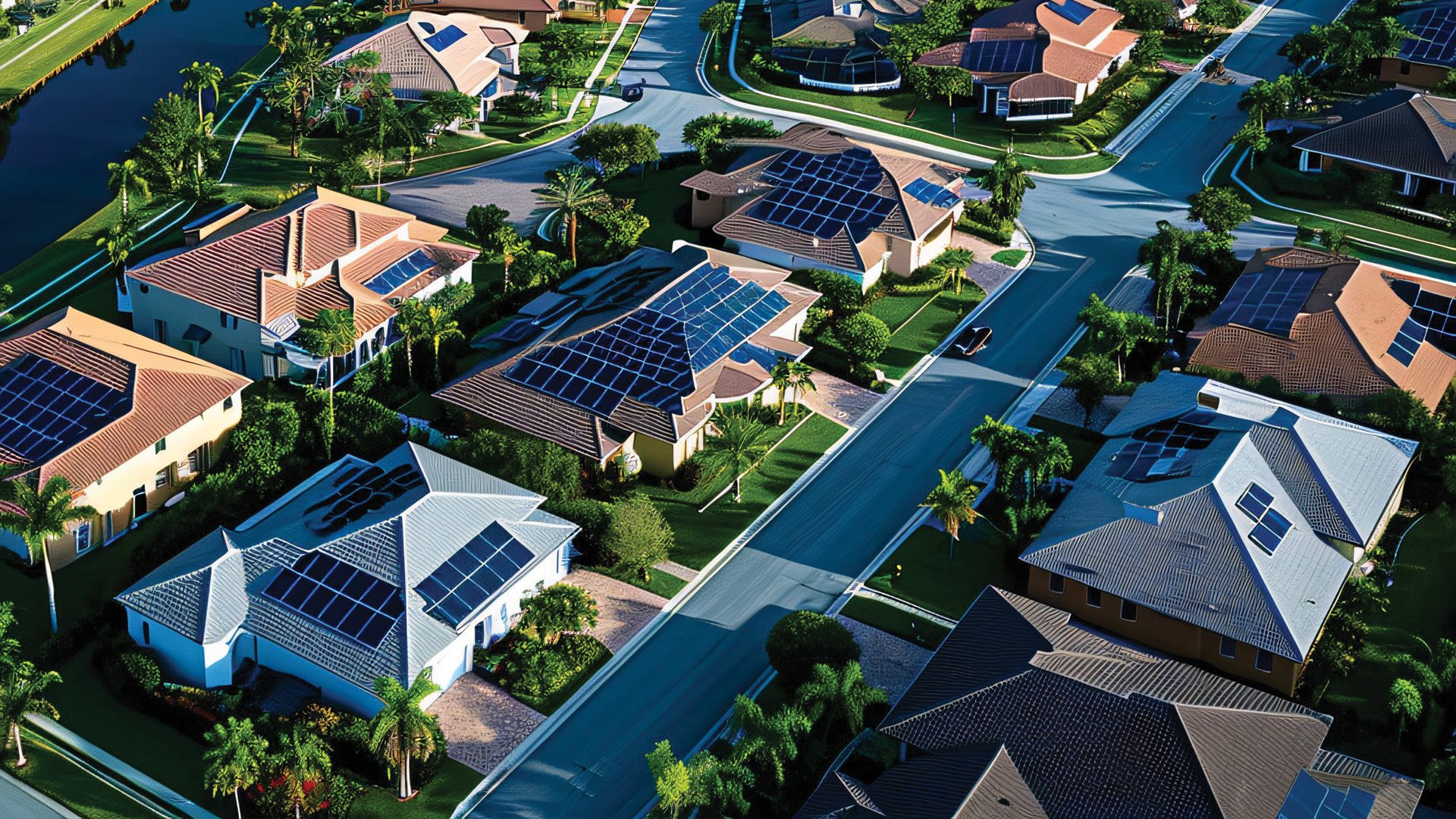Florida’s Solar Revolution: Powering Up the Sunshine State
How is the Florida Solar Market?

The Florida Solar Market is currently experiencing a period of strong growth, ranking number one in the United States for solar installations in the first half of 2023. Here’s a breakdown of some key points:
- High Ranking: Florida has surpassed California and Texas to become the leading state for solar installations. According to the Solar Energy Industries Association (SEIA) and Wood Mackenzie, Florida connected nearly 2.5 gigawatts (GW) of solar generation capacity to the grid during the first half of 2023.
- Significant Growth: Florida’s solar market has seen impressive growth over the past decade. In 2021, the state installed 1.67 GW of solar capacity, and as of June 2022, the total installed capacity reached 9.01 GW, enough to meet the electricity needs of over 1 million homes.
- Economic Benefits: The solar industry creates jobs and boosts the state’s economy. The SEIA estimates a cumulative solar investment of over $20 billion in Florida by Q1 2022, with continued growth expected.
- Potential for More: Despite its current lead, Florida is estimated to have only tapped into about 2% of its rooftop solar potential. This suggests significant room for further growth in the future, especially with supportive policies and initiatives.
However, there are also some factors to consider:
- Policy Landscape: While Florida has seen significant solar development, its policy landscape for renewables is considered less favorable compared to some other leading solar states. The state lacks a renewable portfolio standard (RPS) and doesn’t allow power purchase agreements (PPAs), which can be a barrier for some projects.
The Florida Solar Market is booming, but there’s still room for improvement through potentially more supportive policies to further unlock the Sunshine State’s solar potential.
Can anyone install solar panels in Florida?
No, in Florida anyone can’t install solar panels. While Florida does not have a restriction on homeowners themselves wanting to learn and install solar panels, there are key regulations in place:
- Licensing: Anyone who contracts with a homeowner for installation, alteration, repairs, maintenance, relocating or replacement of any type of solar thermal or PV systems needs a Florida state certification (contractor’s license) for solar work. This ensures qualified professionals handle the electrical and structural aspects of the installation. Homeowners attempting DIY solar could face legal repercussions or struggle to get permits and inspections approved.
- Homeowner Associations (HOAs): Florida’s Solar Rights Act protects homeowners’ right to install solar panels, but HOAs may have reasonable restrictions. These restrictions cannot significantly impair the performance of the panels or increase installation costs excessively. It’s always best to check with your HOA before embarking on a solar project.
Here’s a breakdown of who can and can’t install solar panels in Florida:
Can Install:
- Licensed Solar Contractors: Florida-licensed solar contractors possess the necessary knowledge, experience, and permits to handle solar installations safely and according to code.
Cannot Install (without proper licensing):
- Homeowners Themselves: While some homeowners might be handy and interested in DIY solar, the lack of a license can create problems with permits, inspections, and adhering to safety regulations.
- Unlicensed Contractors: Hiring unlicensed contractors is risky. They may not have the expertise, insurance, or permits required for proper solar installation.
For a safe and legal solar panel installation in Florida, it’s best to work with a licensed solar contractor.
How do I become a License Solar Installer in Florida?
Florida’s booming solar market offers exciting opportunities for those seeking a fulfilling career in clean energy. If you’re interested in becoming a licensed solar installer in the Sunshine State, here’s a comprehensive guide to help you navigate the process:
1. Meet the Eligibility Requirements:
- Age: You must be at least 18 years old.
- Education/Experience: There are two pathways to qualify for a Certified Solar Contractor (CSC) license:
- Experience: Four years of experience in the solar industry, with at least one year spent as a foreman overseeing solar installations.
- Education & Experience: Two years of experience in the solar industry combined with an Associate’s degree in a relevant field (electrical engineering, construction management, etc.) or successful completion of a four-year apprenticeship program approved by the Department of Business and Professional Regulation (DBPR).
2. Pass the Required Exams:
The Florida DBPR administers two computer-based exams for the CSC license:
- Solar Trade Knowledge Exam: This exam tests your understanding of photovoltaic (PV) systems, solar thermal systems, pool/spa heating systems, electrical safety, code requirements, and general solar industry practices.Try our simulated Solar Exam here!
- Business & Finance Exam: This exam assesses your knowledge of business management, construction contracts, estimating, permitting, and financial aspects of solar installations. Try our simulated Florida Business and Finance exam here!
3. Prepare for the Exams:
There are various resources available to help you prepare for the CSC exams:
- Official DBPR Study Guide: The DBPR provides a downloadable study guide outlining the exam topics and reference materials.
- Solar Industry Training Courses: Several organizations offer in-person or online training courses specifically designed to prepare you for the CSC exams.
- Practice Tests: Practice tests can help you familiarize yourself with the exam format and identify areas requiring additional study. CPE offers a wide variety of free and practice tests to get you on your way!
4. Gather the Necessary Documents:
Once you meet the eligibility requirements and pass the exams, you’ll need to compile the following documents for your license application:
- Completed application form (available from the DBPR website)
- Proof of passing the exams
- Verification of experience (if applicable)
- Education transcripts (if applicable)
- Criminal background check report
- Fingerprint scan
- Proof of professional liability insurance
- Application fee
5. Submit Your Application:
Applications and supporting documents can be submitted online or by mail to the DBPR. Processing times can vary, so factor this in when planning your timeline.
6. Find Employment:
Once licensed, you can seek employment with established solar installation companies, become a subcontractor, or even start your own solar business.
Additional Tips:
- Network: Attend industry events, connect with solar professionals on LinkedIn, and build relationships within the solar community.
- Stay Updated: The solar industry evolves rapidly. Stay current with new technologies, regulations, and best practices through ongoing education and professional development opportunities.
- Safety First: Solar installations involve electrical work and potential hazards. Prioritize safety by understanding and adhering to all safety protocols.
- Consider Certifications: Earning additional certifications in specific solar technologies like battery storage or electric vehicle (EV) charging stations can enhance your resume and expertise.
Becoming a licensed solar installer in Florida can be a rewarding career path. By following these steps, acquiring the necessary skills and knowledge, and staying committed to safety and professional development, you can become a valuable asset in the state’s thriving solar industry, contributing to a cleaner and more sustainable future.
See how much solar knowledge you have with our Free Florida Solar test:
Pass your Florida Solar Exam today with our tests
Florida Business and Finance Exam – Fast Practice
With over 600 questions in the practice question bank and only 45 minutes to answer 30 questions, proper preparation is not just beneficial—it’s essential for success.
Florida Business and Finance Exam – Free Practice
Ready to conquer the Florida Business and Finance Exam? Test your knowledge with our free practice assessment that mirrors the actual Pearson Vue exam experience.
Florida Solar Contractor Free Practice Test
Looking to become a licensed solar contractor in Florida? Our comprehensive guide walks you through everything you need to know about the Florida Solar License exam, including a free practice test with 100 questions to help you prepare effectively. Learn about the exam structure, content areas, and essential study resources to boost your chances of success
Florida Solar License Practice Exam
Preparing for the Florida Solar License Exam? Our 325+ question practice test covers all exam topics, including photovoltaics, domestic hot water, and pool heating systems. Learn how to navigate the 11 reference books and pass with a 70% score in 300 minutes.
Florida Solar Contractor License
Florida Solar Contractor LicenseState certification for solar contractors is mandatory for those working on solar thermal or PV systems.Having a...
Master the Florida Business and Finance Exam: Prep Guide
Prepare for the Florida Business and Finance Exam with this guide. With insights into key exam topics, proven preparation strategies, and a 600+ question practice test, you’ll be equipped to succeed. Learn what it takes to pass on the first try!
AIA A201 Free Test
Boost your knowledge of the AIA A201 contract document with our 100-question supplemental practice test for the Florida Business and Finance Exam. This time-limited, 7-question exam mirrors real test conditions and helps you master AIA A201 concepts critical for passing with ease.
AIA A401 Free Test
Enhance your preparation for the Florida Business and Finance Exam with our AIA A401 practice test. Featuring a question bank of over 75 questions and unlimited attempts, this exam is perfect for those mastering the critical AIA A401 document.
AIA A701 Free Test
The AIA A701 Instructions to Bidders document is a critical component of the Florida Business and Finance Exam. Our supplemental practice exam provides 50 targeted questions to strengthen your knowledge of this essential document, increasing your chances of passing the exam on your first attempt.

